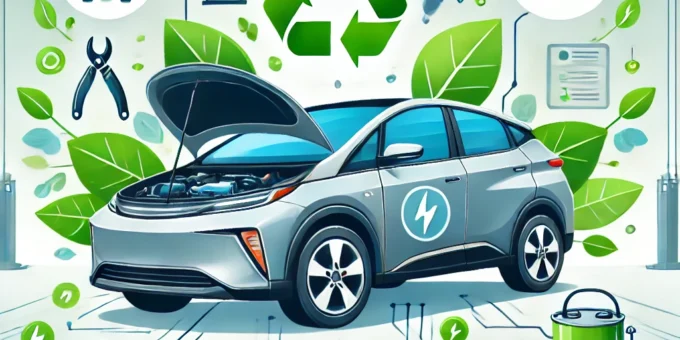
How to Maintain a Hybrid Vehicle for Optimal Performance
Hybrid vehicles are a marvel of modern engineering, combining the efficiency of electric motors with the reliability of traditional internal combustion engines. However, like any vehicle, hybrids require proper maintenance to ensure they run efficiently and reliably. By taking a proactive approach to hybrid vehicle care, you can extend its lifespan, maintain fuel efficiency, and avoid costly repairs.
This guide will provide practical tips on how to maintain your hybrid vehicle for optimal performance, covering everything from battery care to routine servicing and eco-friendly driving habits.
How Does a Hybrid Vehicle Work?
A hybrid vehicle combines a gasoline engine with an electric motor and a high-voltage battery pack. The two systems work together to optimize fuel efficiency and reduce emissions.
Key components include:
- Electric Motor: Provides extra power and reduces fuel consumption.
- Hybrid Battery: Stores energy generated from regenerative braking and the engine.
- Regenerative Braking System: Converts kinetic energy into electricity to recharge the battery.
Understanding how your hybrid operates is essential for maintaining its unique components effectively.
Why Maintenance Is Different for Hybrids
Hybrids share many maintenance requirements with traditional gas-powered cars, but some unique components, like the battery and regenerative braking system, require special care. Here’s what sets hybrid maintenance apart:
- Fewer Oil Changes: The engine in a hybrid doesn’t work as hard as in a conventional car, so oil changes are less frequent.
- Battery Longevity: Hybrid batteries are designed to last for years but still need attention to ensure optimal performance.
- Regenerative Braking Wear: Regenerative brakes experience less wear than traditional brakes but require specialized maintenance.
Regular Engine Maintenance
Despite being partially powered by electricity, hybrids still rely on internal combustion engines. Regular engine care includes:
- Oil Changes: Follow the manufacturer’s recommendations, usually every 5,000–10,000 miles.
- Air Filter Replacement: Keep the engine running efficiently by replacing air filters every 15,000–30,000 miles.
- Spark Plug Care: Inspect and replace spark plugs as needed, typically every 30,000–60,000 miles.
Hybrid Battery Care and Maintenance
The hybrid battery is the heart of your vehicle, and proper care can extend its life significantly:
- Keep the Battery Cool: Avoid prolonged exposure to extreme heat or cold. Park in shaded areas during summer and in garages during winter.
- Regular Driving: Hybrids perform best when driven regularly. Avoid leaving the vehicle idle for extended periods.
- Monitor Battery Performance: If you notice a drop in fuel efficiency or reduced range, have the battery inspected.
Regenerative Braking System Maintenance
Regenerative braking reduces wear and tear on traditional brake components, but it still requires attention:
- Inspect Brake Pads: Even with regenerative braking, traditional brake pads will wear over time and need replacement.
- Monitor Regenerative Braking Efficiency: If braking feels less responsive, have the system checked by a hybrid-certified mechanic.
Maximizing Fuel Efficiency
Hybrids are designed to save fuel, but you can improve efficiency further by:
- Driving Smoothly: Avoid rapid acceleration and sudden braking.
- Using Eco Mode: Most hybrids have an Eco Mode that optimizes energy use.
- Proper Tire Pressure: Under-inflated tires reduce fuel efficiency.
Check Hybrid-Specific Components
Hybrid vehicles have additional components that require periodic maintenance:
- Inverter: Converts DC electricity from the battery to AC for the motor.
- Hybrid Control Module: Manages the interaction between the gas engine and electric motor.
- Motor-Generator: Functions as both a motor and a generator, depending on the driving mode.
Have these components checked during regular service appointments.
Seasonal Maintenance Tips
- Winter: Batteries are less efficient in cold weather. Precondition your car (if equipped) to warm up the battery before driving.
- Summer: Use air conditioning sparingly, as it can reduce fuel efficiency and drain the battery faster.
Understanding Your Warranty
Most hybrid vehicles come with extended warranties for their batteries, often covering 8–10 years or 100,000–150,000 miles. Familiarize yourself with what’s covered and schedule any necessary repairs within the warranty period to save money.
DIY vs. Professional Maintenance
While you can handle basic tasks like tire pressure checks or air filter replacements, hybrid-specific maintenance (like battery diagnostics or inverter care) should always be handled by a hybrid-certified mechanic.
DIY Tasks:
- Checking tire pressure.
- Replacing wiper blades and cabin air filters.
- Monitoring fluid levels.
Professional Tasks:
- Battery inspections and repairs.
- Regenerative braking maintenance.
- Hybrid system diagnostics.
Common Hybrid Maintenance Mistakes to Avoid
- Neglecting the Battery: Ignoring warning signs of battery trouble can lead to costly repairs.
- Skipping Regular Service: Hybrid systems require periodic diagnostics to catch issues early.
- Using the Wrong Mechanic: Not all mechanics are equipped to handle hybrid technology.
FAQs About Maintaining Hybrid Vehicles
How long do hybrid batteries last?
Can I replace a hybrid battery myself?
What are the signs of a failing hybrid battery?
Do hybrids cost more to maintain than gas cars?
How often should I service my hybrid?
Maintaining a hybrid vehicle for optimal performance doesn’t have to be complicated. With regular care, attention to hybrid-specific components, and eco-friendly driving habits, you can keep your car running smoothly for years to come.
Whether you’re a first-time hybrid owner or a long-time enthusiast, taking the time to understand and prioritize maintenance will ensure your vehicle remains fuel-efficient, eco-friendly, and reliable. Schedule regular checkups, drive mindfully, and enjoy the many benefits of hybrid ownership!